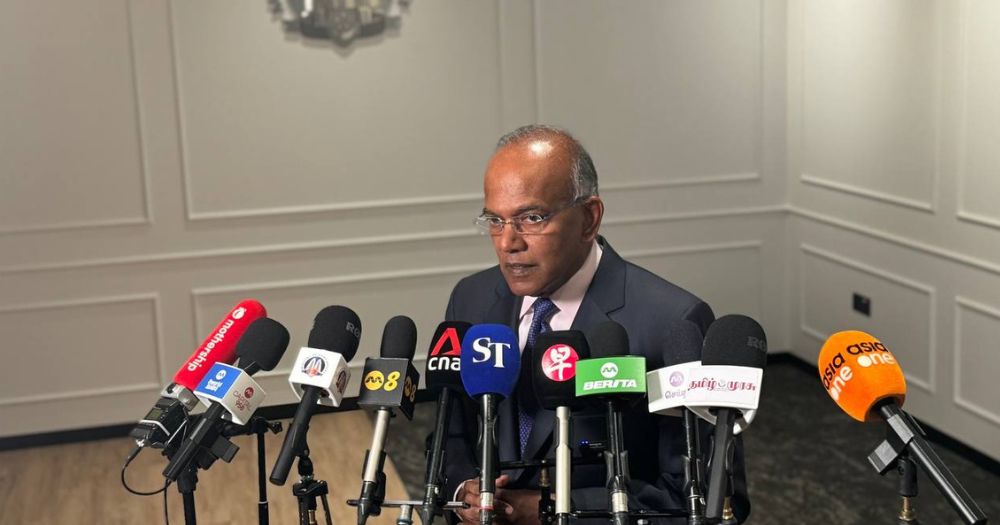A Bangladeshi national who had previously attracted attention in Bangladesh for his alleged extremist teachings and terror links entered Singapore on Aug. 9, 2024, to illegally preach to a group of Bangladeshi migrant workers at their dormitory.
In his sermon, Hamza Md Amir @ Amir Hamza made many extremist segregationist statements, Minister for Home Affairs and Law K Shanmugam told the media on Aug. 21.
The ministry is now investigating Amir Hamza, as well as the organiser and other persons involved in the event, the Ministry of Home Affairs (MHA) said in a press release on Aug. 21.
Known for alleged extremist teachings
According to the ministry, Amir Hamza has attracted security attention in Bangladesh after reportedly promoting religious intolerance, hatred and violence in his sermons.
He is also alleged to be an influential figure in Ansar al-Islam (AAI), a pro-Al-Qaeda terrorist organisation operating in Bangladesh.
In 2021, Amir Hamza was arrested by the Bangladeshi government for his purported terror links, for terrorism-related activities and for inciting militancy, MHA said.
Entered Singapore with different name
On how Amir Hamza entered Singapore, Shanmugam said that he used a passport with a name that was slightly different from what ISD had in their database.
He used a passport that appeared to be a “validly issued passport”, he added.
While the Internal Security Department was aware of Amir Hamza and his background, they did not have his biometrics at the time of his entry into Singapore on Aug. 9.
When asked if the processes at the airport will be reviewed, Shanmugam said:
“The airport is not a cantonment. You cannot be interviewing every person who's coming in as if he is maybe a potential radical, or someone who might be a radical.”
“People have to feel welcomed coming into Singapore,” he added.
In Amir Hamza's case, he "slipped through" because of the passport, which seems to be a "legitimate passport with a different name", Shanmugam explained.
"It's always not easy when people do that, and it's a balance that we have to strike," he said.
Gave sermon at dormitory
Amir Hamza gave his sermon to Bangladeshi workers at a migrant worker dormitory, on Aug. 9.
In his sermon, Amir Hamza espoused extremist and segregationist views, the ministry said.
Additionally, he also held up alleged Bangladeshi extremists as “bastions of religious piety”, including several leaders of the Islamist party Jamaat e-Islami, which is banned in Bangladesh.
Amir Hamza had also politicised his sermon, the ministry added.
He labelled the previous Bangladeshi government led by former Bangladesh Prime Minister Sheikh Hasina as “oppressors” and claimed that they had sentenced individuals to death for opposing them.
He left Singapore a day after, on Aug. 10.
Two days later, the authorities received police reports on Aug. 12 that he had preached to a group of Bangladeshi migrant workers.
Regarding the specifics of the workers at the event, such as who and how many were involved, Shanmugam said they were matters of detail subjected to investigation, and he was unable to go into details at this point.
Did not have appropriate permit to give sermon
Neither Amir Hamza nor the organiser had applied for the necessary approval for him to give a sermon in Singapore, MHA said.
Public assemblies in Singapore are regulated under the Public Order Act 2009, and organising or participating in one without a Police permit constitutes an offence.
Additionally, foreigners who wish to conduct talks in Singapore that are “religious, cause-based or political” in nature must obtain a Miscellaneous Work Pass.
According to the Ministry of Manpower’s website, the Miscellaneous Work Pass is for eligible foreigners on short-term work assignments, such as seminar speakers, religious workers, or journalists.
Investigations ongoing
Shanmugam said that what Amir Hamz said affects Singapore’s national security and is contradictory to our values.
Investigations into the persons involved are ongoing and strong action will be taken if they are found to have breached Singapore's laws, or pose security concerns, MHA stated.
This includes deportation, prosecution or detention under the Internal Security Act.
“We will not tolerate anyone, foreign or local, spreading and promoting views that threaten Singapore’s security, or our racial and religious harmony.”
Foreigners should also not import their politics into Singapore, and carry out activities here in pursuit of such agenda, MHA stated.
MHA encouraged the public to stay vigilant and report suspicious individuals and activities to the authorities.
Majority of Bangladeshi workers are law-abiding: Shanmugam
When asked if Singapore is facing a problem of radicalisation among the Bangladeshi migrant worker community, Shanmugam responded, “Not quite”.
He said the “overwhelming majority” Bangladeshi workers in Singapore are law-abiding.
From 2015 to now, ISD has investigated about 40 workers, he said.
There are currently around 200,000 workers, so 40 is a small number, he noted.
“But we don't take chances. We continuously work with the different communities. We make it clear to them what is accepted in Singapore, what is not accepted in Singapore, and we will take action against anyone who attacks another race or religion.”
Top photo by Mothership
If you like what you read, follow us on Facebook, Instagram, Twitter and Telegram to get the latest updates.



